Marine Life & Conservation
The Dive Bus – an innovative driving and diving force on Curaçao!
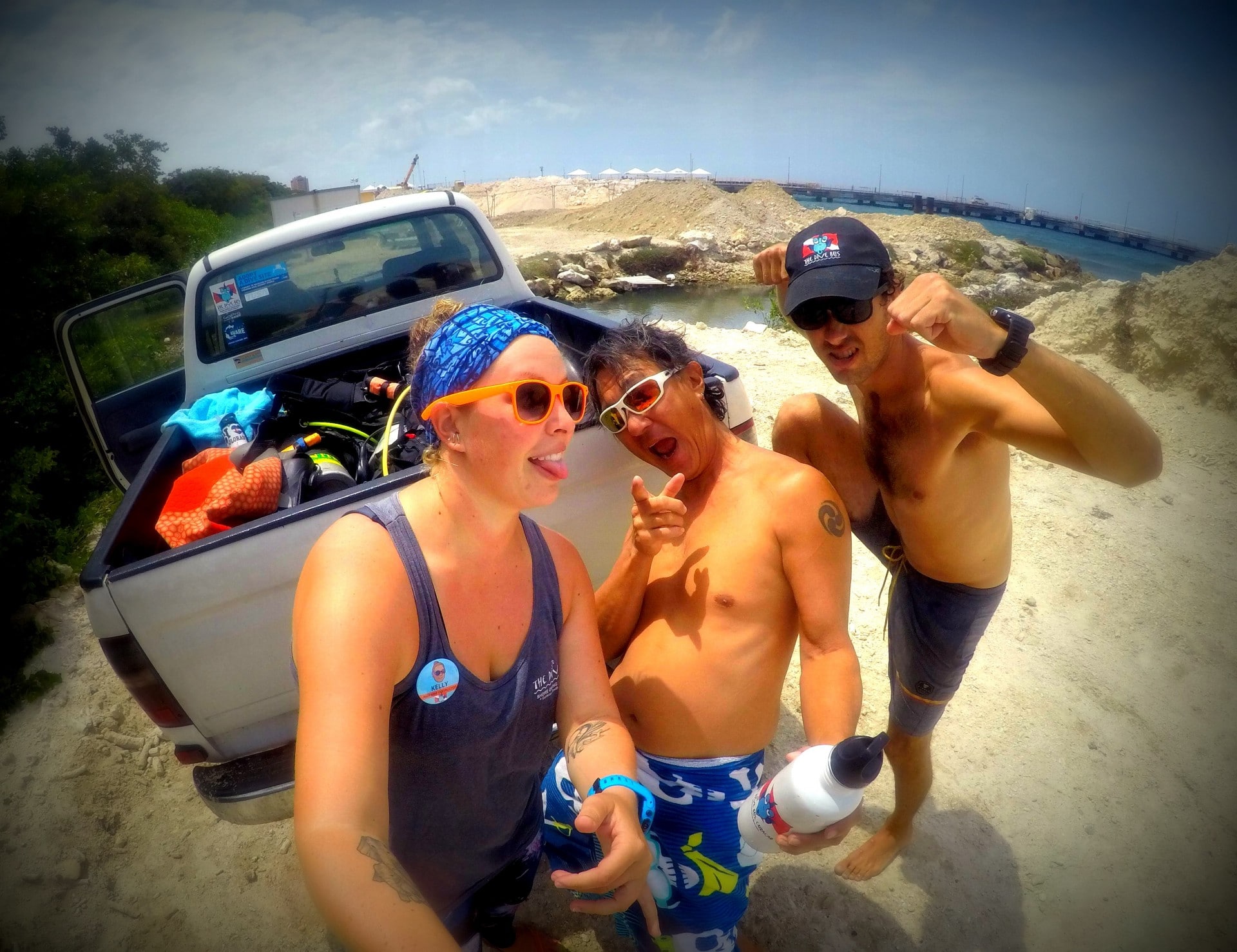
In 2004, with close to a thousand boat dives under their weight belts, PADI Instructors, Mark and Suzy Pinnell had their first ever shore diving experience in Bonaire which changed their perspective of diving forever.
“Having always worked on and dived from boats, we couldn’t believe the total freedom of shore diving. No schedules, no waiting for other divers or cutting our dives short with a half tank of air left. We could totally come and go as we pleased,” says Mark. “We had no idea how much that experience was to influence our lives.”
Their next stop was Curaçao, the “C” in the ABC Islands, a 10-minute flight from Bonaire. At that time, Curaçao was better known as a boat diving destination, so the couple naturally jumped onboard and checked out some great boat diving sites being offered such as such as Watamula, Mushroom Forest and Eastpoint.
As much as they enjoyed these wonderful sites, one afternoon while they were enjoying a post-dive beer on a small locals’ beach, at the edge of a sheltered fishermen’s bay, they had a major realization:
“The drop-off looked really close by,” recalls Suzy. “Much closer than most of the dives we’d made in Bonaire. So, we checked it out as our first shore diving in Curacao. It was amazing, but seriously unloved. Plentiful, amazing corals and sponges and a thousand fish, somehow thriving amongst years of trash, fishing line, lost anchors, tires – and someone’s discarded porn CD collection!”
After that, they shore-dived as much of Curacao as they could, and it was quickly apparent that the absence of shore diving in Curacao wasn’t due to a lack of amazing shore diving opportunities. They were blown away with the easier shore entries, shorter swim outs to the reefs from the shore and how similar the abundance, quality and variety of marine life was to Bonaire.
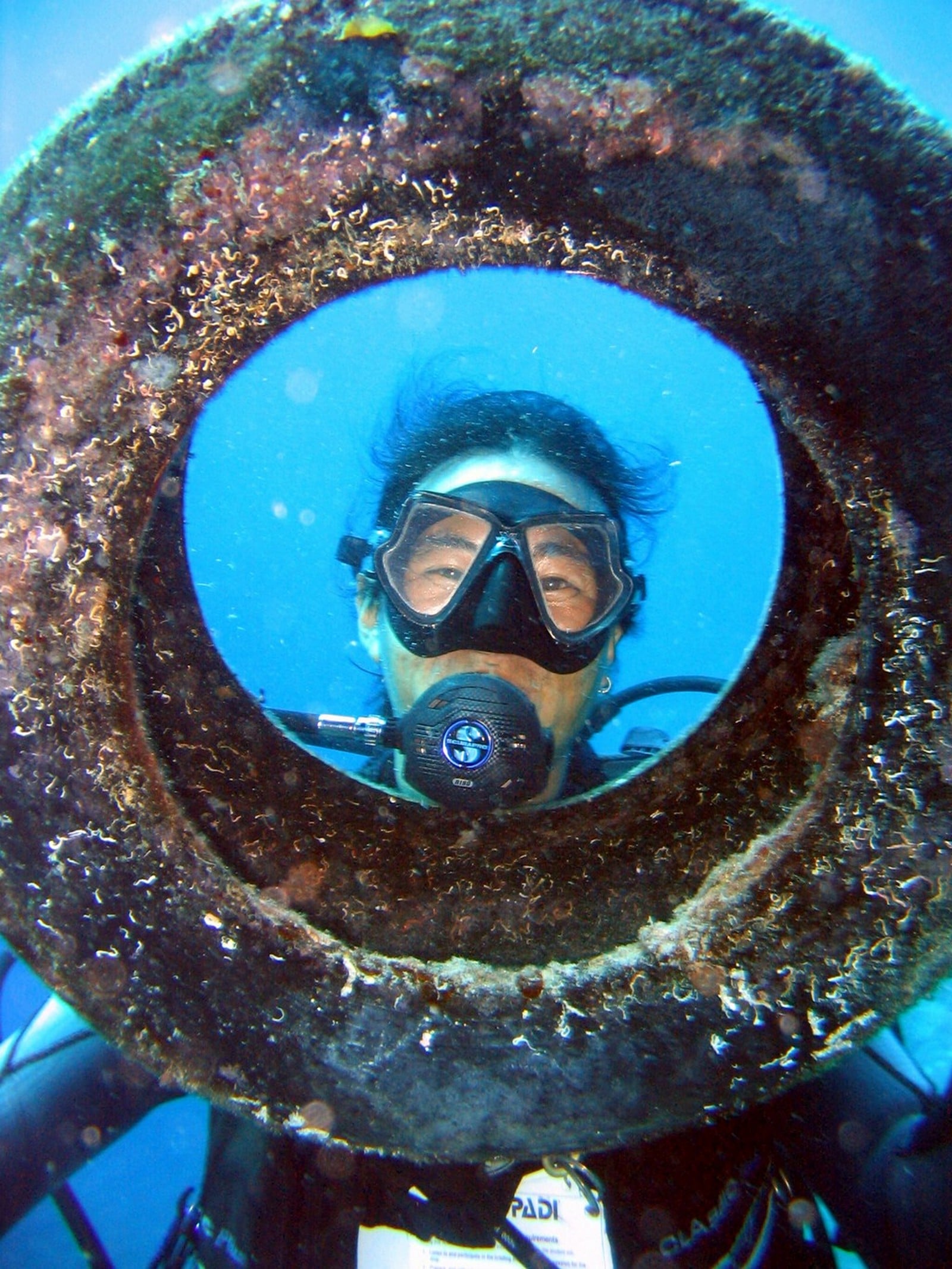
Long story short, Mark and Suzy’s tiny little dive operation, The Dive Bus Curacao, hit the road in early 2005, with a unique and simple concept: “Seriously fun shore-diving adventures”. They focused on quality, fun shore diving, in small, friendly relaxed groups, with a strong focus on taking care of Curacao’s reefs.
That first, beautiful, unloved Curacao reef became The Dive Bus house reef, taken care of on countless clean up dives, and by working with the local fishing community for sustainable management of the marine environment. These values became the heart of The Dive Bus Eco Policy, a cornerstone of their operation, mandating respecting, protection and giving back to the local community.
When they opened their first dive shop – the tiny little “Dive Bus Hut” on that same beach, word spread, divers came flocking in, Mark appeared as a Project AWARE Clean Up “poster boy” in major dive magazines, PADI welcomed The Dive Bus as an official dive center and several fun years flew by.
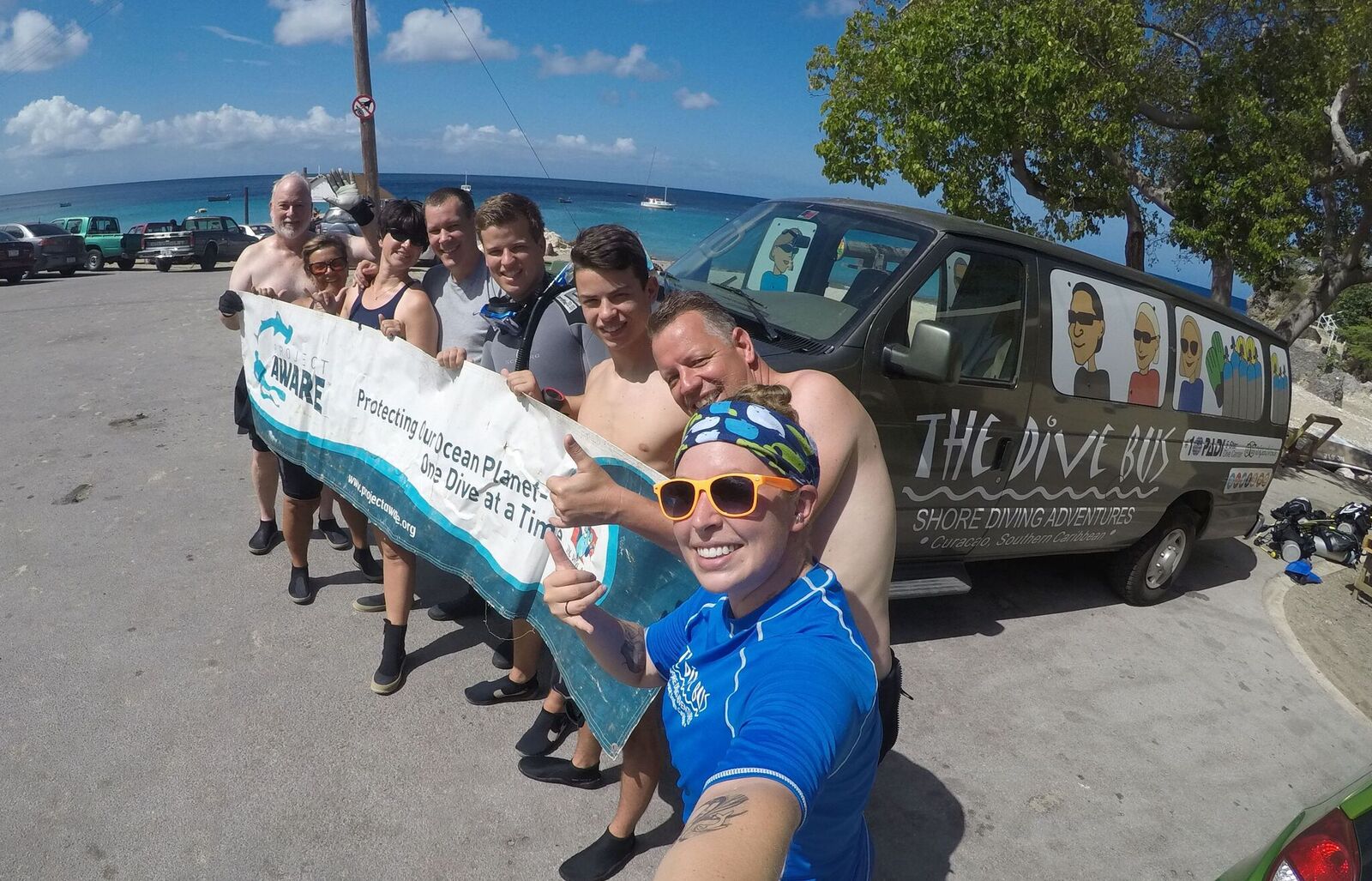
In 2010, Mark and Suzy relocated The Dive Bus to its current, much larger location just across the street from their beloved house reef. The Dive Bus became a PADI 5 Star Dive Center and added a dive retail shop, with drive-up equipment rinsing, drying and storage facilities, tank pick up and drop off and a second Dive Bus.
“We did our best to ensure that divers had easy access to anything and everything they needed to get the most of their shore diving adventures – including a cold beer or 2 while their gear drip-dries,” laughs Suzy.
As the dive center expanded, so did their commitment to minimize their environmental impact. The Dive Bus became a PADI Green Star Dive Center, Curacao’s first 100% Project AWARE operator and the first to Adopt a Dive Site through the Project AWARE initiative. In recognition of these efforts and making it easy for divers to join in and make a difference, Mark was appointed as a PADI Ambassadiver in 2016.
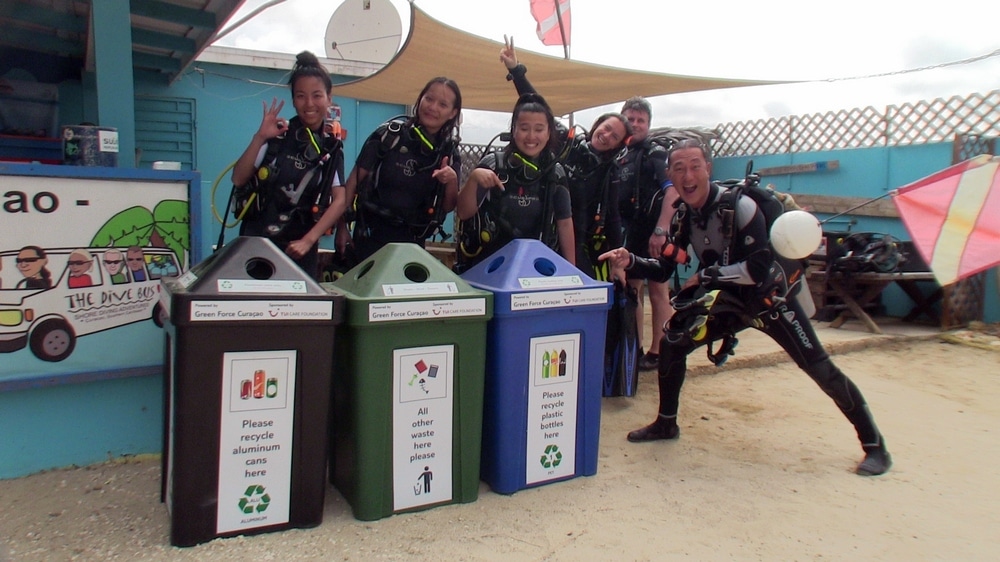
“Diving may not be most people’s first idea of a career,” said Mark, “But it certainly turned out to be mine, and I wouldn’t change it even if I could. My mission is to keep on living the dream, encouraging people to fall in love with diving, on magnificent reefs that we all help keep beautiful.”
Earlier this year, Bonaire was voted best shore diving destination in the 2017 Readers Choice Awards with previously little-known Curacao 2nd best. The whole Dive Bus Crew were thrilled and Mark and Suzy decided to take another lesson from Bonaire and put Curacao in first place next time around.
In partnership with a major international car rental company, they’re excited to introduce their new Dive Bus DRIVE and DIVE Packages, saving divers time and money by booking their rental car and diving in one place.
“So many of our divers rent cars whilst they’re here in Curacao that it makes sense to take care of that at the same time as their diving – and save time and money,” said Suzy. “They can choose off-the-shelf guided or independent DRIVE and DIVE Packages or custom-build their own to suit their needs, budget and timescales. Either way, the more days they drive, dive or both, the more money they save. We think they’re going to love it!”
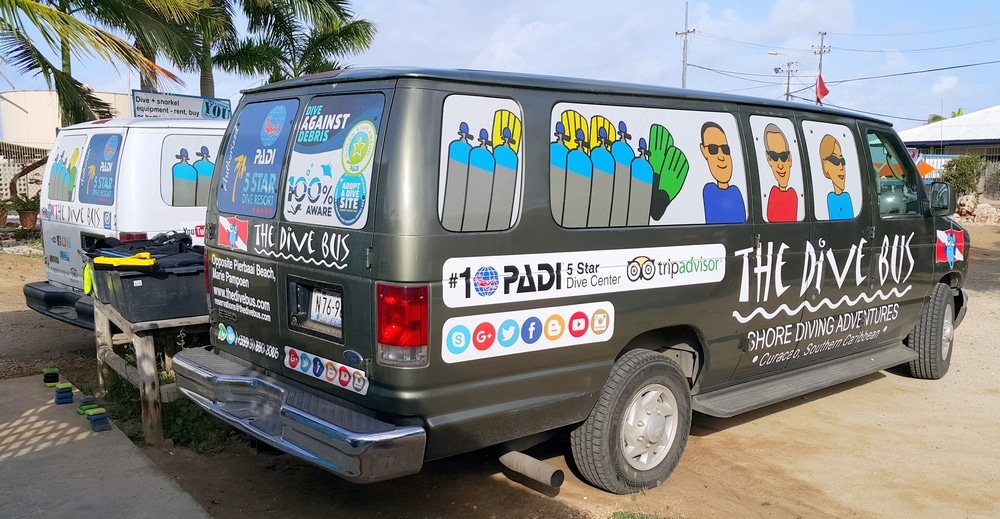
Long-time Canadian Dive Bussers, Jamey and Lori certainly love it:
“As frequent divers in both Bonaire and Curacao, it’s great that The Dive Bus is now offering DRIVE and DIVE Packages for those wanting to spend several days or more exploring the great reef diving accessible from shore in Curacao. We like the independent dive packages that The Dive Bus have always offered, and adding a rental car is a great idea as it saves us a bunch of time and admin during the booking process. As we know from indie diving in both Curacao and Bonaire, the drive and dive concept is really convenient. Just drive to a beach at your leisure and prepare for your shore diving adventures in your own time. While both islands offer great shore diving with similar reefs, for us we think Curacao offers greater choice for apres-dive, in terms of sightseeing and a wider variety of restaurants and night life. A DRIVE and DIVE Package like this enhances the whole Curacao vacation experience, especially whilst diving with The Dive Bus which, in our opinion, is the best dive operator on the island.”
Dive in to your next Caribbean adventure with the first and only, The Dive Bus Curaçao! A truly unique experience where passion for scuba diving adventures is combined a deep connection with sustainable ocean management and conservation. Find out more, contact The Dive Bus Curaçao.
Marine Life & Conservation
Paul Watson Released as Denmark Blocks Japan’s Extradition Bid

Renowned anti-whaling activist Paul Watson has been released from custody in Greenland after spending five months in detention. Denmark’s Justice Ministry rejected Japan’s request for his extradition, citing insufficient guarantees that his time already served in custody would be credited against any potential sentence.
The 74-year-old Canadian-American was arrested on July 21 in Nuuk, Greenland’s capital, when his ship docked to refuel. His arrest was based on a 2012 Japanese warrant related to a 2010 encounter in Antarctic waters. Japan alleged Watson obstructed operations and caused damage to a whaling research ship during efforts to disrupt illegal whaling. Watson has consistently denied these claims, maintaining his commitment to marine conservation.
Denmark, which oversees extradition matters for Greenland, concluded that while the legal conditions for extradition were met, the lack of assurances from Japan regarding time-served credit made extradition untenable.
In a video shared by his foundation, Watson expressed gratitude and relief, saying, “After five months, it’s good to be out… and good to know they’re not sending me to Japan.” He added that the most difficult part of his time in custody was being separated from his two young sons.
Watson is a pioneering figure in marine conservation, known for founding the Captain Paul Watson Foundation in 2022 after decades of activism with the Sea Shepherd Conservation Society. His bold efforts to defend marine life have earned him widespread support, including from celebrities and conservationists. His work has also been featured in the acclaimed reality TV series Whale Wars.
Watson’s lawyer, Jonas Christoffersen, praised the decision, stating, “We are happy and relieved that Paul Watson is now free.” He added that Watson is eager to reunite with his family and continue his vital work.
The arrest occurred while Watson’s vessel, the M/Y John Paul DeJoria, was en route to the North Pacific with a team of 26 volunteers to intercept a Japanese whaling ship. His foundation described the arrest as politically motivated and emphasized that Watson’s actions were focused on ending illegal whaling practices.
Japan resumed commercial whaling in 2019 after leaving the International Whaling Commission, asserting that whale meat is a cultural tradition. Conservationists, however, continue to challenge these practices, highlighting their impact on marine ecosystems.
Despite the challenges, Watson remains steadfast in his mission to protect marine life and bring attention to whaling practices. His dedication to ocean conservation has made him a globally respected advocate for the environment.
Marine Life & Conservation
12 Days of Zero-Waste Fish-mas

This holiday period, the Marine Conservation Society, the UK’s leading ocean membership charity, invites you to make some simple changes to eating fish this Christmas to help our seas.
Dr Kenneth Bodles, Head of Fisheries and Aquaculture at the Marine Conservation Society, said, “During the festive season, our consumption increases, but so does waste. Sustainability isn’t just about where food comes from – it’s also about how you use it. By reducing waste and making the most out of your seafood, you’re not only taking steps to be more ocean-friendly, but can also help to cut costs during what is often one of the most expensive times of the year”.
The Marine Conservation Society has compiled twelve tips on how to consume seafood sustainably with zero-waste this Christmas:
Buy whole fish instead of fillets
Instead of fillets, consider buying whole fish such as salmon, hake, or lemon sole. By adopting a “nose to tail” approach with cooking, whole-baked fish not only feeds a crowd, but also helps to minimise waste and maximise sustainability by using up every part of the animal, including bones, skin, and fat.
Make fish stock
Leftover fish bones or shells can be put to good use by boiling them to make a nourishing fish stock or bisque. This can be frozen and preserved for later use and makes for a flavourful base in a soup.
Make your own fish pâté
Avoid waste by turning leftover fish, such as smoked mackerel or salmon, into a delicious pâté by blending with cream cheese and lemon. Perfect when paired with crackers.
The sustainability of salmon and mackerel varies depending on where and how it is caught or farmed. For more information on green-rated options, check the charity’s Good Fish Guide.
Buy frozen
By purchasing seafood that is frozen or vacuum-packed, this helps to reduce waste by extending the shelf life of your food.
Fish pie
If you’re wondering what to do with leftover cooked fish, why not opt for a classic fish pie with mashed potatoes, leeks, and a cheesy sauce? A sure crowd pleaser on Boxing Day.
Use the head
Don’t forget the fish head! The meat is incredibly tender and flavourful. The charity recommends a cod’s head curry or recreating Fallow’s renowned cod’s head in siracha butter.
By stretching your ingredients further, not only is this a more sustainable way to enjoy seafood, but also cost-effective by repurposing leftovers and cooking creatively.
Boxing Day brunch
Mix leftover kippers or smoked salmon with scrambled eggs for a tasty, zero-waste, Boxing Day brunch.
For best choice, make sure you buy kippers, or herring, from the North Sea and the North Irish Sea.
Zero-waste storage
A top tip from the Marine Conservation Society to avoid waste is freezing fish offcuts to save for future use.
Crisp up the skin
Even leftover fish skin can be turned into a quick savoury snack by crisping it up in an air fryer with a little olive oil and salt.
Anchovies two ways
Leftover anchovies can either be blended with butter to make a delicious anchovy butter or tossed into pasta for a hit of umami flavour.
The charity recommends opting for anchovies caught in the Bay of Biscay for best choice.
Fishcakes
For an easy, zero-waste meal, leftover seafood trimmings can be mixed with mash and fried in breadcrumbs to make fishcakes.
Pickled mussels
Try pickling mussels in 1:1 vinegar and water, with a dash of sugar for a sustainable, zero-waste snack that can be enjoyed well beyond the festive season.
Mussels farmed in the UK are a seafood superhero. Grown using low-impact methods and harvested by hand, they get all the food they need from the sea around them. This makes them one of the most sustainable, ocean-friendly, and cost-effective seafood options.
Players of People’s Postcode Lottery have raised £6.6M towards the Marine Conservation Society’s vital work in making seafood more sustainable.
Laura Chow, Head of Charities at People’s Postcode Lottery, said: “Fish is a festive favourite for many, but making sustainable choices when it comes to how we buy and eat seafood makes all the difference for our ocean. Support from players of People’s Postcode Lottery has helped the Marine Conservation Society further its sustainable seafood work, so that we can all enjoy healthier, better protected seas.”
The Marine Conservation Society encourages you to make sustainable seafood choices a year-round habit, not just for Christmas. To check how sustainable the seafood on your plate is, you can visit the charity’s Good Fish Guide. The Guide helps consumers and businesses identify the most sustainable seafood using a simple traffic light system, based on where and how species are caught or farmed. Green is the best choice, amber means improvements are needed, and red indicates fish to avoid buying.
Zero-waste gift idea
Why not embrace a zero-waste Christmas by gifting a membership to support marine conservation? It’s a meaningful, low-waste gift that helps protect our ocean for generations to come. Memberships start from as little as £5 a month – the price of a sandwich and drink from your local coffee shop.
Find the latest sustainable seafood advice for wild-caught and farmed seafood on the Good Fish Guide, downloadable to your phone from www.mcsuk.org/goodfishguide.
-

 News2 months ago
News2 months agoIconic SS United States to become the World’s Largest Artificial Reef
-

 News3 months ago
News3 months agoBook Review – 52 Assignments: Underwater Photography
-

 Gear News3 months ago
Gear News3 months agoDYNAMICNORD – New German diving brand enters the British market
-

 News3 months ago
News3 months agoExploring Cenote El Pit: A Diver’s Dream
-

 Gear News3 months ago
Gear News3 months agoTry BARE drysuits (and maybe even win one!) this Friday with Sea & Sea at North West Dive Fest
-

 Marine Life & Conservation3 months ago
Marine Life & Conservation3 months agoBook Review: Coral Triangle Cameos
-

 Blogs2 months ago
Blogs2 months agoDive the Egyptian Red Sea this Autumn with Regaldive
-

 News3 months ago
News3 months ago2024 Ocean Art Underwater Photo Competition Announced



